The Ford F-150 Lightning, a 6,000-pound harbinger of the electric future, cloaked in the familiar sheet metal of Middle America’s favorite truck. It looks like a regular F-150 because, well, that’s part of the genius. Ford didn’t build a spaceship; they built a pickup for folks who still think a torque wrench is a lifestyle accessory.
When One-Pedal Driving Turns Unpredictable
But as this recent crash highlights on the Lightning Owners Forum, even the most familiar silhouettes can hide strange, unpredictable new behaviors under the hood, or lack thereof.
“I purchased a 2024 Flash this past September and absolutely love it. However, I use one pedal driving and, now that I'm forced to think about it, have had 3 random incidences of rapid braking in traffic, and two instances of sudden acceleration after taking my foot off the brake pedal when parking. It's been so random that it happened, and I immediately forgot about it.
Today, the two came together and I totaled the vehicle in front of me.
Situation: I was coming up to a light to make a right turn and was coasting to a stop using one pedal driving. The truck would likely have stopped naturally without me needing to touch the brake. I was not traveling fast. However, about 10-15' from the vehicle in front of me, the anti-collision braking suddenly engaged throwing me forward, and then the truck suddenly accelerated ... like pedal to the floor acceleration.
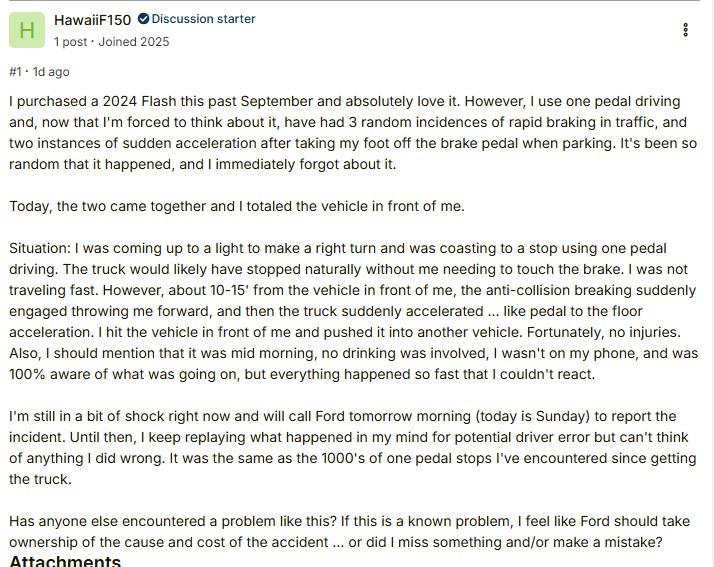
I hit the vehicle in front of me and pushed it into another vehicle. Fortunately, no injuries. Also, I should mention that it was mid morning, no drinking was involved, I wasn't on my phone, and was 100% aware of what was going on, but everything happened so fast that I couldn't react.
I'm still in a bit of shock right now and will call Ford tomorrow morning (today is Sunday) to report the incident. Until then, I keep replaying what happened in my mind for potential driver error but can't think of anything I did wrong. It was the same as the 1000's of one pedal stops I've encountered since getting the truck.
Has anyone else encountered a problem like this? If this is a known problem, I feel like Ford should take ownership of the cause and cost of the accident ... or did I miss something and/or make a mistake?”
This isn’t a tech blog anecdote or a throwaway dealer complaint—this is the new face of unintended consequences in the EV age. A feature designed to simplify the driving experience ended in a pile-up, and the account reads less like user error and more like a moment when the machine seized control.
Regenerative Braking vs. Collision Mitigation
One-pedal driving, in theory, is an elegant solution for regenerative braking. In practice, it’s a behavioral shift, and in rare instances, like this one, it can go from futuristic to frightening in the space of a few feet.
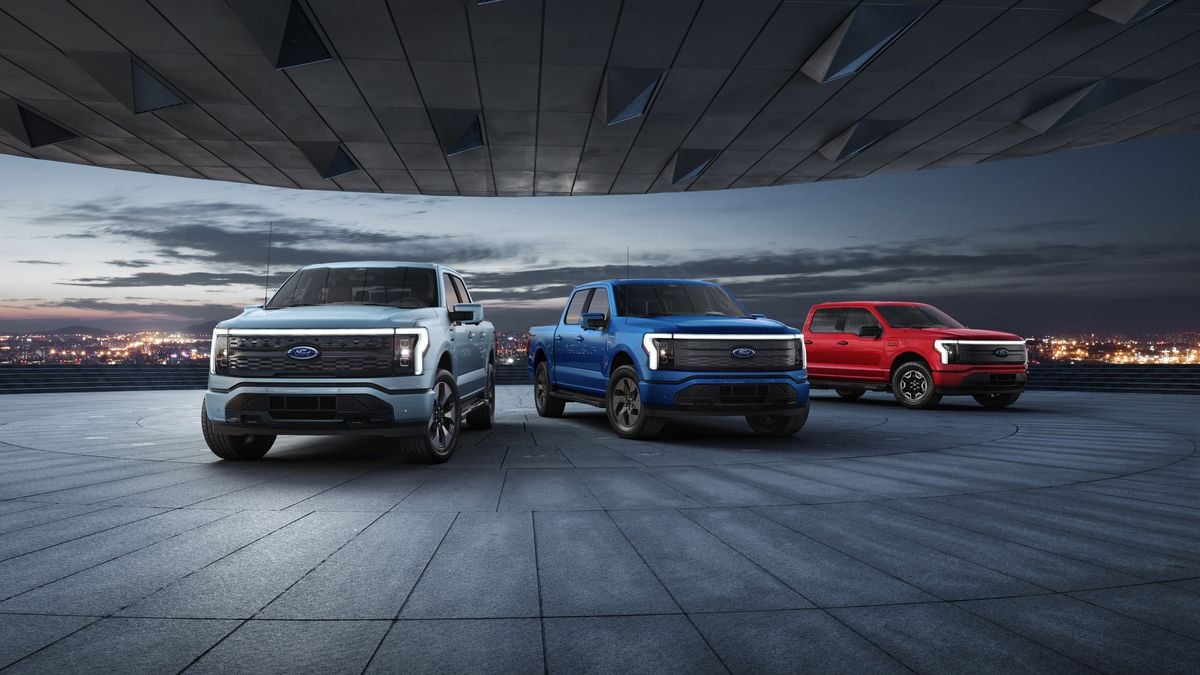
One user took to the comment section to talk about what may have caused the collision,
“it almost sounds like, as you were 'thrown' forward, due to the sudden stopping, you may have at the same time accidentally touched and engaged your CRUISE CONTROL 'ON' button...
I believe you also can customize/disable the active Anti-Collision features...
and, I really don't think 'One Pedal' has much of anything to do with this, as this feature would bring you to a complete stop, not activate any increase in speed, unless you 'accidentally' touched the GO pedal in the process…”
“one thing we all have to reason with, is, that while automated driving features are nice, and they are, we have to have our foot ALWAYS at the ready, always not far from the brake pedal, and prepared for action - you never know. It should also always be our DEFAULT action, no matter what. Laws are designed for us to have to brake, and not anything else, for most all situations we find ourselves in, otherwise we can be held responsible if other actions are used, instead, such as 'swerving' to avoid an accident, animals, etc.
As an insurance agent, many times a customer will complain that while they 'tried' to avoid an accident, avoid hitting a deer, or dog, but ran into the ditch, instead, the insurance company is now considering the claim as COLLISION(you made a mistake), rather than COMPREHENSIVE(the animal made a mistake), leaving the customer with a spot on their record.
Likely, any and all rear-end collisions will be considered just that, COLLISION, no matter 'why' it may have happened. People claim that someone stopped too fast in front of them, or they lost their brakes, etc. It doesn't matter. That's why we have insurance. We sure don't feel like it's 'our fault', none-the-less.”
Classic Looks with Cutting-Edge Performance
To its credit, the Lightning is brilliantly designed. Ford resisted the temptation to create something overtly alien like the Cybertruck, a polygonal fever dream that looks like it was rejected from a Blade Runner sequel. Instead, the Lightning presents itself as a familiar face with a secret. Aside from a smoothed front fascia and lightbar in place of a grille, it looks every bit like its internal combustion sibling. That subtlety is its strength. It invites the skeptics in, rather than pushing them away with sci-fi excess. But no matter how conventional it looks, this truck operates in an entirely different dimension.
Key Production and Pricing Comparisons Between EV Pickups
- Ford has faced production halts for the F-150 Lightning, including a six-week pause starting mid-November 2024, to align supply with demand and address financial losses in its EV division.
- The F-150 Lightning offers a more traditional design and starts at a lower price point compared to the Tesla Cybertruck, which has seen price increases, with its base model now nearing $100,000.
- Both trucks offer impressive capabilities, but the Cybertruck boasts higher horsepower and a longer range, while the F-150 Lightning provides practical features like better towing technology and interior comfort.
Behind the wheel, the Lightning doesn’t pretend to be anything but electric muscle. It’s composed, quietly brutal, and as quick as anything in its class, arguably quicker. Compared to the Chevy Silverado EV’s soft approach or the GMC Hummer EV’s over-the-top bravado, the Lightning has a purposeful, almost analog feel. Even Tesla’s Cybertruck, for all its shock value, feels more like a tech demonstrator than a workhorse. The Lightning, however, walks the line. It’s a tool first, until, evidently, it decides to be something else entirely under duress.
When Automation Becomes a Bystander
One-pedal driving works by aggressively decelerating the truck when you lift off the accelerator, no brake input is necessary. But add layers of collision mitigation, sensor-driven logic, and instant torque delivery, and suddenly, the system becomes something drivers aren’t fully in command of. The issue isn’t that one-pedal driving exists, it’s that it coexists with other automated systems, and when they conflict, the driver becomes a bystander.
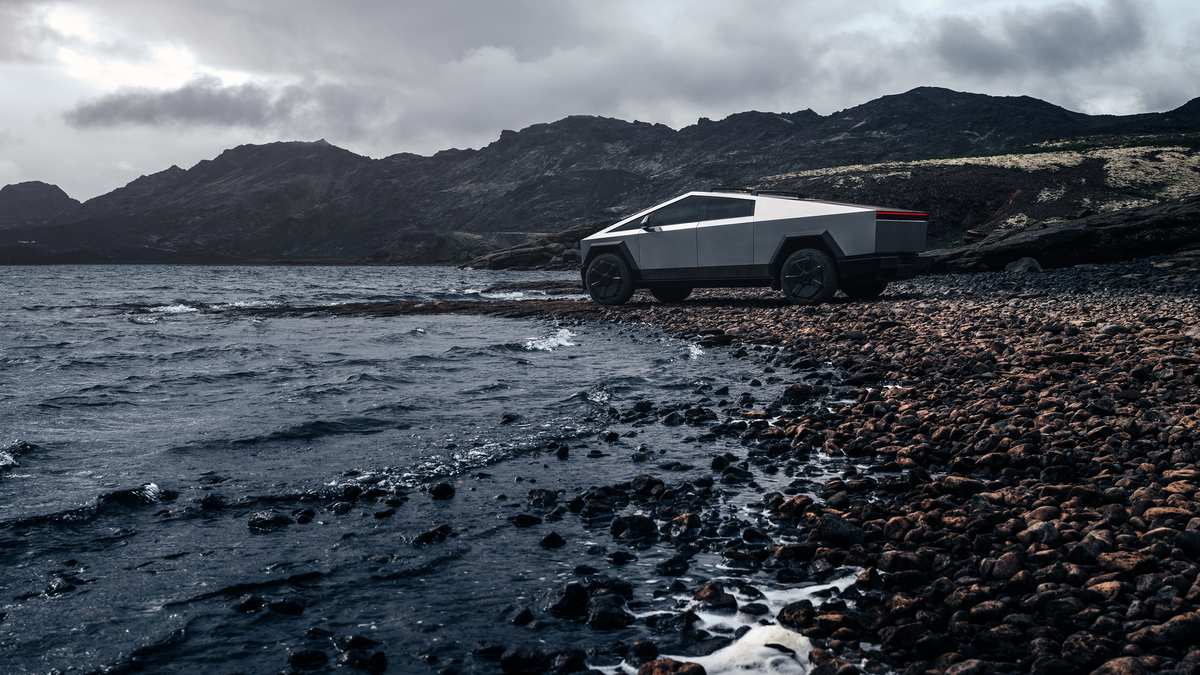
So what happened here? Perhaps it was a misfire in Ford’s anti-collision software or a fluke in regenerative response logic. Either way, the result was the same, unexpected full acceleration after aggressive deceleration. That’s not something you shrug off. It’s the kind of anomaly that raises serious questions about system redundancies and error detection.
Let’s hope the driver is okay, and let’s hope Ford takes this seriously. The Lightning remains a technical marvel and a cultural milestone, it is, after all, the first electric truck of its kind in America. But as we've seen, innovation without refinement can carry risks. The hardware may be solid, but the software still has lessons to learn. Until then, the electric revolution rolls on, one pedal at a time, whether we’re ready or not.
Noah Washington is an automotive journalist based in Atlanta, Georgia. He enjoys covering the latest news in the automotive industry and conducting reviews on the latest cars. He has been in the automotive industry since 15 years old and has been featured in prominent automotive news sites. You can reach him on X and LinkedIn for tips and to follow his automotive coverage.
Set Torque News as Preferred Source on Google


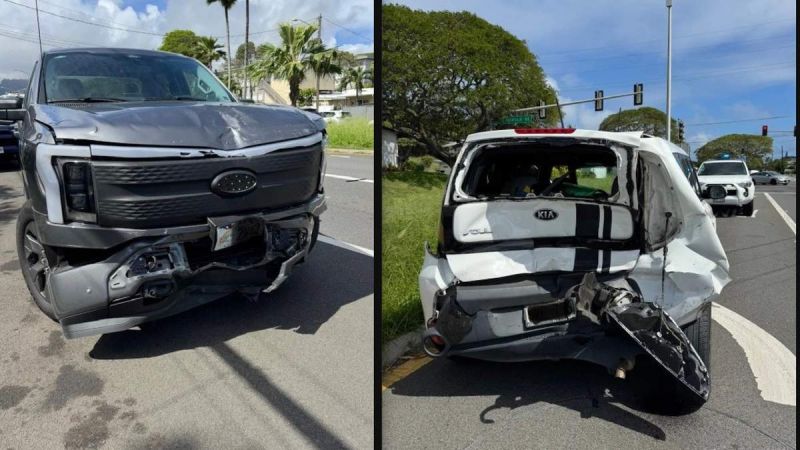




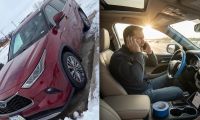
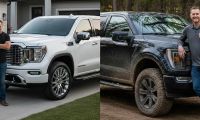

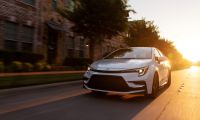

Comments
Should a recall be issued…
Permalink
Should a recall be issued for this?
Yeah the driver needs to be.
Permalink
In reply to Should a recall be issued… by Noah Washington
Yeah the driver needs to be.